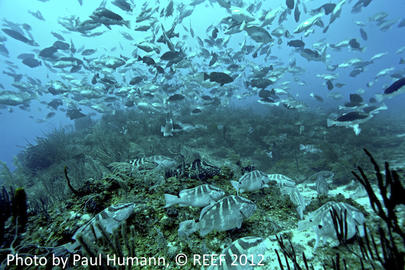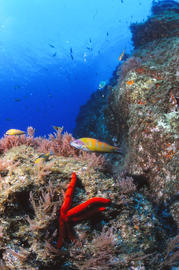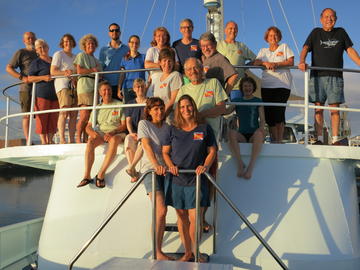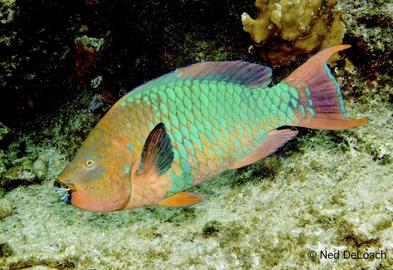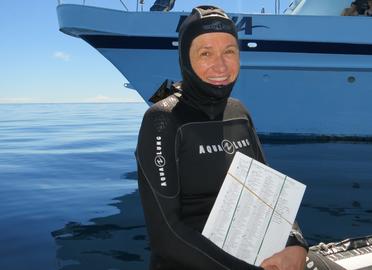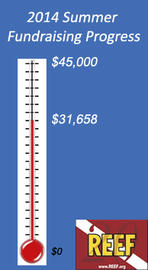A new scientific paper that features research from REEF's Grouper Moon Project, "Hot Moments in Spawning Aggregations", was recently published in the journal, Coral Reefs. The study looked at the impact of a Nassau Grouper spawning aggregation in creating biogeochemical "hot moments", which occur when a temporary increase in one or more limiting nutrients results in elevated rates of biogeochemical reactions.
In 2006, researchers from Univeristy of North Carolina Willmington collaborated with Grouper Moon Project researchers from REEF and Cayman Island Department of Environment to conduct mobile hydroacoustic surveys on the Little Cayman spawning aggregation site. Hydroacoustics, which is similar to a fish finder device found on a recreational fishing boat, but with better resolution and technology, has emerged as a valuable tool in fishery population assessments.
Despite uncertainties surrounding the population status of the protected Atlantic Goliath Grouper’s, fishery managers are under pressure to end the harvest moratorium in place since 1990. This study sought to measure the proportion of anglers interested in reopening the goliath grouper fishery and to identify key reasons for this interest. The authors also estimated the amount that anglers would be willing to pay for a Goliath Grouper harvest tag (the right sold to an angler to harvest one goliath grouper).
This paper reviewed the population status of Atlantic goliath grouper, Epinephelus itajara, in coastal waters of the southeastern United States. The study is based on quantitative surveys conducted by the authors and the Florida Fish and Wildlife Conservation Commission’s Artificial Reef Program (n = 505), coupled with data submitted by REEF surveyors (n = 27,542) over 15+ yrs.
We are excited to announce a new expansion of the Volunteer Fish Survey Project to the eastern Atlantic, beginning with a new program in the Azores. REEF's Director of Science, Christy Pattengill-Semmens, Ph.D., spent time in the islands earlier this summer developing new survey and training materials. This Portuguese archipelago is the northern extent of a bioregion known as Macaronesia, which also includes Madeira, the Canary Islands, and the Cape Verde Islands.
We are pleased to announce the 2015 REEF Field Survey Trip Schedule. We have an exciting lineup of destinations planned and we hope you will join us. These trips offer a great introduction to fish identification for novice fishwatchers, and are a fun way for experienced surveyors to build their life list while interacting with fellow fishwatchers. We are also offering two of the ever-popular Invasive Lionfish Research Expeditions. REEF staff, board members, and other REEF experts lead these trips, and each features daily classroom seminars and a full diving schedule.
Every month, scientists, government agencies, and other groups request raw data from REEF’s Fish Survey Project database. Here is a sampling of who has asked for REEF data recently and what they are using it for:
- Scientists from NOAA’s Office of Protected Resources are using REEF data to evaluate populations of seabass and grouper in the Caribbean.
- A scientist from the University of Washington School of Marine and Environmental Affairs is using REEF data on fishes and invertebrates to evaluate MPAs in the Puget Sound.
REEF members are at the heart of our grassroots marine conservation programs. Over 50,000 divers, snorkelers, students, and armchair naturalists stand behind our mission.
This month we highlight Janet Eyre. Janet has been a REEF member since 2002, and has conducted 1,125 surveys. She is on the Advanced Assessment Team as an Expert Surveyor in four of REEF’s regions! Janet happily describes herself as a true fish nerd, and she has taken a lead role in assisting with REEF’s expansions to the tropical western Pacific. Here's what Janet had to say about REEF:
There is one week left to DOUBLE YOUR DONATION, and we need $13,300 to reach our goal! Help REEF’s important marine conservation programs by donating to the largest matching campaign in our history. Please donate online today.

